SIR,—Tom Scott and Sydney Goodsir Smith have written to criticise
my review of Honour'd Shade.
(1) Of course, Mr. Smith was not concealing his use of Yeats's 'The Great Day.' But my point was that Mr. Smith's poetry consisted mainly of rather lifeless and ornate poetic diction, therefore it was significant that in the one place where a personal voice did speak out vigorously, the phrases had to come from somewhere else.
(2) It is true that I know little about Gaelic (tine of my academic qualifications is in English Literature and Language, the other in Scottish Literature). But this hardly matters in criticising Lowland-Scottish literature, for poetry in Scots owes little or nothing, in content, modes or diction, to the Gaelic influence. There are two cultures in Scotland, based on two societies : the West-Highland—crofting-cum-fishing, Gaelic-speaking, with a literature mainly oral; and the Eastern-Southern or Lowland--big farms, semi-
industrialised fishing, heavy industries, Scots- and English-speaking, with a literature existing mainly in printed books. This idea that the two parts of Scot- land deeply interpenetrate each other is a myth, originating in the wilder side of Hugh MacDiarmid's Kulturkampf. (3) As for my (necessarily fleeting) remark that 'poetry is now a backwater,' may I say that what am interested in is literature. My point was that it Is not at all surprising, considering the matter histori- cally, that a collection of new poems should be rather trifling. Consider the past century's achievement : in America, Melville, Hawthorne, Twain and James; In France, Stendhal, Balzac, Flaubert and Zola; in Russia, Gogol, Tolstoi, Turgenev, Dostoevsky, Tchekov and Gorky; in England, Dickens, George Eliot, Hardy, Conrad and Lawrence. Can the con- temporary poetry rival, that fiction in range and depth? Surely it is fiction we look to now.—Yours faithfully.
DAVID CRAIG
University Bungalows C 264. Peradeniya, Ceylon










































 Previous page
Previous page